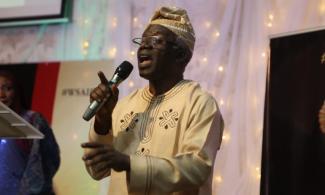
According to a petition filed by Falana and Falana's Chambers, it was also alleged that the Ministry of Interior unilaterally increased the Combined Expatriate Residence Permit and Alien Card (CERPAC) fee to $2,000 from the initial $1,000 without recourse to the extant law of the land.

The Ministry of Interior has been accused of criminal diversion of public funds into a dedicated account, in contradiction to the Treasury Single Account (TSA) policy of the Nigerian Government.
According to a petition filed by Falana and Falana's Chambers, the Ministry of Interior unilaterally increased the Combined Expatriate Residence Permit and Alien Card (CERPAC) fee to $2,000 from the initial $1,000 without recourse to the extant law of the land.
The petition, personally signed by Femi Falana, human rights lawyer and Senior Advocate of Nigeria (SAN), dated January 29, 2019, and exclusively made available to SaharaReporters, was entitled: ‘Criminal Diversion of Public Funds and Wrongful Enrichment of a Foreign Consultant by the Ministry of Interior Through Extortion of Foreigners Resident in Nigeria in Gross Violation of the Central Bank Act Presidential Executive Order No 5 2018 and Federal Government Policy in Treasury Single Account.’
The firm also alleged that only 30 per cent of the $2,000 collect by the consultant, Continental Transfert Technique, owned by an Indian national, was paid to the coffers of the Federal Government at the official rate of N306 per dollar, while foreign consultants were allowed to pocket the remaining 70 per cent.
The firm purported further that the foreign consultants had been directed by the Minister of Interior to pay the said 30 per cent into a dedicated account in a commercial bank, insisting that this was in a flagrant contravention of the Federal Government’s policy on TSA, which unified government accounts to enable the Federal Ministry of Finance to maintain oversight of government cash flow.
Falana noted that the fees payable by foreigners resident in Nigeria is $1,000 annually, but the Ministry of Interior increased it by 100 per cent after being advised to do so by the foreign consultants.


The petition noted that the increase, which had made Nigeria’s figure the highest in the world, was surprisingly implemented within 48 hours of the recommendation by the Indian firm.
The petition added: “Apart from the fact that the huge amount of revenue realised from the increase of the CERPAC fee is not captured in the Appropriation Act 2018, the engagement of foreign consultants to collect it is a contravention of the Presidential Executive Order No 5 of 2018, which has prohibited the engagement of foreigners to perform services, which can be provided locally for Nigerian citizens.
“Furthermore, all foreigners resident in Nigeria are made to pay the CERPAC fee of the exchange rate of N370 per dollar contrary to the provisions of Section 15 and 20 of the Central Bank of Nigeria (Establishment) Act, which stipulates that the unit of currency in Nigeria shall be divided into one hundred kobo and that the currency rate issued by the Central Bank shall be the legal tender for the payment of any amount. It is therefore illegal to order that the CERPAC fee be paid in a foreign currency in Nigeria.”
The chambers urged Zainab Ahmed, the Minister of Finance, to use her good offices to stop the illegal increase of the fee and also direct that the Naira equivalent of the approved $1,000 be paid directly into the account of the Nigerian government, in line with the TSA policy, while the Economic and Financial Crimes Commission (EFCC) should be directed to recover the funds that had been “criminally derived through the foreign consultants engaged by the ministry.”
Falana threatened that if the requests were not granted, he would not hesitate to institute legal proceedings at the Federal High Court for the recovery of the funds that had been “criminally diverted” since January 1, 2019 by “some highly placed officials of the Ministry of Interior and their foreign collaborators”.